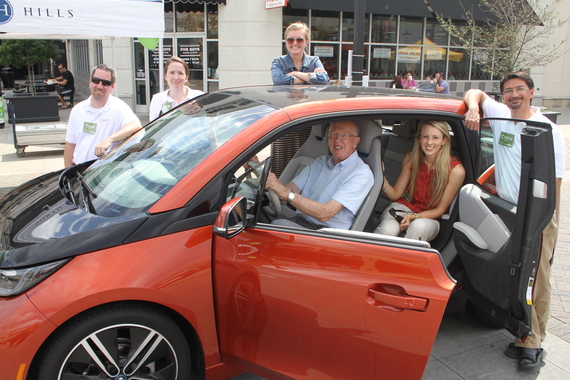
As current and recently-elected governors consider which issues to prioritize in their new terms, electric vehicle policies should be on the list. Why? These programs will help them address environmental, health, and economic issues all at once.
This week, 67 businesses and organizations sent a letter to the governors and governors-elect of the 11 Northeast and Mid-Atlantic states urging them to take specific actions that will accelerate EV adoption. Notably, many businesses signed the letter because they see a transition to EVs as a crucial way to spur domestic jobs and energy security. Letter signers include the utilities National Grid and Con Edison because of the important intersection between EVs and electricity policies.
Some states in the region -- such as Maryland, Pennsylvania, and Massachusetts -- have EV consumer rebates in places that are starting to accelerate EV sales. Some states are installing public charging stations, allowing EV drivers to access carpool lanes, and adding EVs to their state and municipal fleets. Many states are finding that a high-level task force composed of government leaders, utilities, private-sector companies, and public interest groups, is the best way to jumpstart and maintain strong EV programs. Recently, the International Council on Clean Transportation released a report assessing the most effective EV consumer incentives, which include programs that reduce the price and improve the convenience of EVs.
Whether a state has done a lot or a little in promoting EVs, it's not been enough to date. No resting on laurels! Eight states, including six in the Northeast and Mid-Atlantic and two in the West, have committed to get 3.3 million zero-emission vehicles on the road by 2025. The governors of these state pledged to this target because they know EVs are a key clean energy solution that will help us slash carbon and smog emissions, create jobs, and shift our reliance on domestic energy sources. But if we are to meet or beat this goal -- as we must to safeguard the planet -- then states need to invest much more in their EV programs.
I'm pleased to say that the Sierra Club and our chapters in the region signed the letter and joined with Acadia Center, Conservation Law Foundation, and Natural Resources Defense Council in recruiting others to sign on. From where we sit, a switch to EVs offers a critical opportunity to protect the climate, and we make this clear in part of the letter:
Since EVs have little or no conventional tailpipe emissions, they can be a key component to improving health outcomes and reducing costs to treat illnesses caused or worsened by this pollution. EVs also have significant climate benefits. With the current electricity generation mix in the region, a car that only uses electricity from the grid will be responsible for 50-70% less greenhouse gas pollution than a comparable gasoline-only vehicle. As we shift to cleaner sources of electricity, public health and environmental benefits of EVs will only increase over time. This is a stark contrast to trends in the petroleum industry where dirtier oil sources are entering the market in increasing quantities.
Check out the specific recommendations in the letter and who signed onto it. If you'd like to join us in urging state governments to prioritize EVs, send us a note at electric.vehicles@sierraclub.org.
First photo credit: open source. Second photo credit: Advanced Energy.

